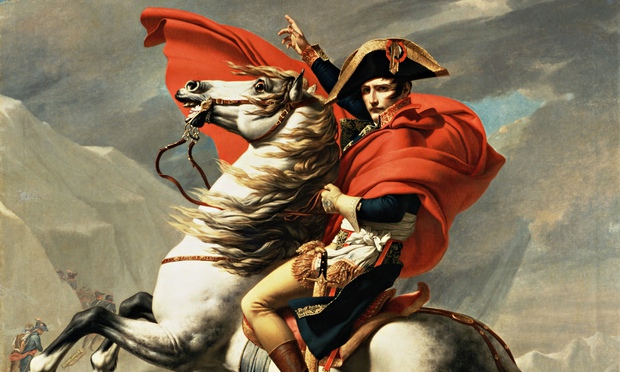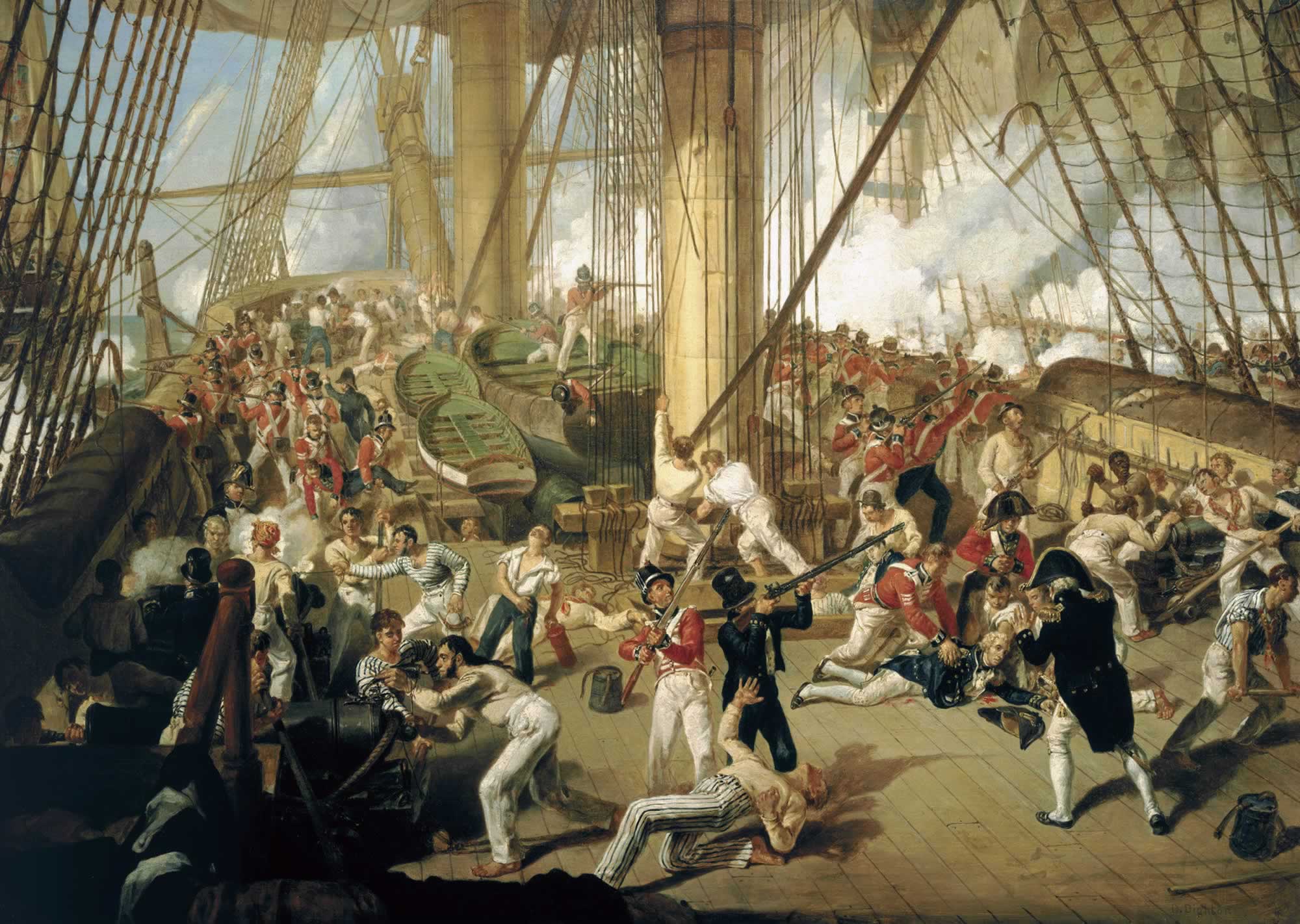But I haven't really done an article for this blog on the subject, so might as well fix that!
So, what if Napoleon invaded England in 1805?
 |
| Forward! And we shall capture... uh, Brighton? Manchester? |
southern England to commence with his well trained, well equipped Armée d'Angleterre crossing the channel in barges, despite their inability to deal with large waves or choppy water, but neither was a factor when the army crossed.
When the Army arrived, as individual corps in multiple locations along the coast, the British were both surprised, but prepared. Years of preparation had built defences at likely landing places, and over 480,000 men had volunteered for the army by 1804 to defend their nation, many more than could be properly armed and trained. The militia and the Regular Force provided tens of thousands more troops, but the Regular Force was very small, the militia was for local use and also not very well trained or equipped. But the 200,000 men of Napoleon's army, while less than 2/5ths the size of the British troops that would face them, had the advantage of better training, competent officers, and Napoleon himself, the unequivocal master of early 19th century warfare. Martello towers built by the British were insufficient to halt the fast moving French forces or the landings, and in many cases surrendered without firing a shot.
Napoleon himself landed near Hastings, where William the Conqueror had won his great victory in 1066, and was faced by a British force, lead by King George III of England himself. While the King was sick, and most likely completely crazy at this point, he refused to allow himself to be overthrown while he sat idly by. However, the old King, and generals who had yet to face Napoleon in Battle, were comprehensively defeated in the Second Battle of Hastings on July 27, 1805. In the next two week's, the Army of England destroyed all opposition, and in a brilliant flanking maneuver, surrounded the British Army, with few near Maidstone, and forced the commander, Prince Fredrick, Duke of York, to surrender.
 |
The Grand Old Duke of York isn't exactly well known for his
military prowess...
|
However, the victories came at a cost. The stout English defense, even with ill trained troops and later accented by guerilla warfare, cost Napoleon over 40,000 soldiers from deaths and injuries, and the British army was starting to regroup in the north around Coventry. Even with Napoleon installed in London, Prime Minister Pitt and the King refused to surrender, though many of the MPs of the House of Commons and the House of Lords were starting to feel it was a lost cause. Napoleon took the field again in late August, and inflicted more defeats on British army. But more and more, the victories were becoming costly, and the PM and the King continued to stay one step ahead of Napoleon, rallying the nation to steel themselves for a long war.
But in late August, just as Napoleon was winning his victory Coventry, the Royal Navy that had been tricked to sailing to the West Indies returned, and hearing the news, quickly swept up the channel, destroying the ships and barges that were supplying the French. A massive battle just under the Cliffs of Dover, lead by Admiral's Horatio Nelson and Collingwood destroyed the French Fleet. Though Nelson was killed when a sharpshooter felled him, the Navy was victorious, and the Battle of Dover would go down in British Legend as the navy's greatest victory, and Nelson Britain's greatest hero.
 |
| Nope, not going to let Nelson survive in this timeline either. |
Late in the evening, the army from Wales arrived, and threw themselves into the battle, smashing into Napoleon's extended left flank. The French regulars wavered, but didn't break, but soon Napoleon realized that if he didn't pull back, he would be fully surrounded by larger, superior forces. Reluctantly, he ordered a retreat, and fell back to London. The British didn't pursue mostly because an effective rearguard convinced the commanders that it would be too costly.
Napoleon's image of all knowing conqueror shattered, he returned to London with only 125,000 men. He was now outnumbered almost four to one, but he resolved to hold the capital of England for as long as possible. But news of defeats by the Austrians in Italy and the Prussians in the Rhineland forced Napoleon's hand. He slipped away in the dead of night, taking a fast carriage to get to the coast, to a waiting boat that would ferry him quickly to France. Just north of the town of Haywards Heath, however, a British resistance band sprang up and captured the wagon, and captured Napoleon Bonaparte, Emperor of France, the conqueror of Europe.
Within days of the news, the French army nearly fell apart at the news. Marshal Ney, in charge of the calvary, tried to organize a rescue, but the fighters and their capture managed to reach Oxford, and a large military force, along with King George III and PM William Pitt, where their to sign the Treaty of Surrender. In comparison with may of the treaties, the one that was forced on Napoleon was rather reasonable: Napoleon would be allowed to return to France, and resume his title of Emperor, and the military would not be constrained by size. However, the navy would be, and would be not allowed to be more than 50% of the size of the Royal Navy, and Napoleon would not be allowed to make an alliance with Spain for 15 years, or be allowed to build a fleet or station it on any Atlantic coast. The Netherlands would be given their independence. In return, the UK would agree to 10 years of peace, and would not sign an alliance with any nation opposed to Napoleon in Europe. Further, England would officially vacate all territories that they took from France that they said they would leave in the Treaty of Amiens, and pay for all ships and cargos captured and impounded during the blockade of French ports.
 |
| Why has no one made a Grumpy Napoleon meme yet? |
The invasion of Britain was a huge setback, and nearly destroyed France, while it all but ensured that French and English rivalry would continue for decades. Napoleon still harbored intentions of invading and subjecting the "island of shopkeepers," but political crisis and unrest in Paris kept him busy for years, as were plans to try to build a new, powerful French navy. When war broke out again under Napoleon's son in 1847 the French were in a much better position and able to fight toe to toe with the British, and even managed to land a force in Quebec and "liberate" it from the English. But under Napoleon's nephew, Napoleon III, the Empire at last crumbled in the 1880s, facing economic stagnation, political infighting, and military defeats in Germany and Spain. France would continue to alternate between kingdom, republic, and empire for the next 100 years, before the Fourth French Republic took power in 1974.
The war changed England as well. While the British managed to eventually throw Napoleon and the French off of Great Britain, the impact of being invaded meant that the British could never be complacent again, and solely rely on the Royal Navy as they had for decades. A large standing army was maintained since 1807, and when European nations began to introduce Conscription, Britain followed suit. They also decided to embrace European Alliances, at first with Austria and Prussia, the Prussia and Russia, and then Germany and Austria, and finally, at the outbreak of the War of 1909, it was Germany and Austria, leaving France and Russia outmatched.
 |
| There. Did it. NOW MAKE IT POPULAR!!! |
Great scenario for the new year: I can see Britain being invaded, even temporarily, leaving a huge shadow both for that nation and the rest of the world.
ReplyDeleteWhile it might not be your cup of tea, I highly recommend Naomi Novik's Temeraire series, where she introduces the idea of dragon combat in the Napoleonic wars. It's actually a well-researched set of battles, and her (**SPOILERS**) description of Napoleon's eventual invasion of Europe and the resistance put up is quite the thought experiment.